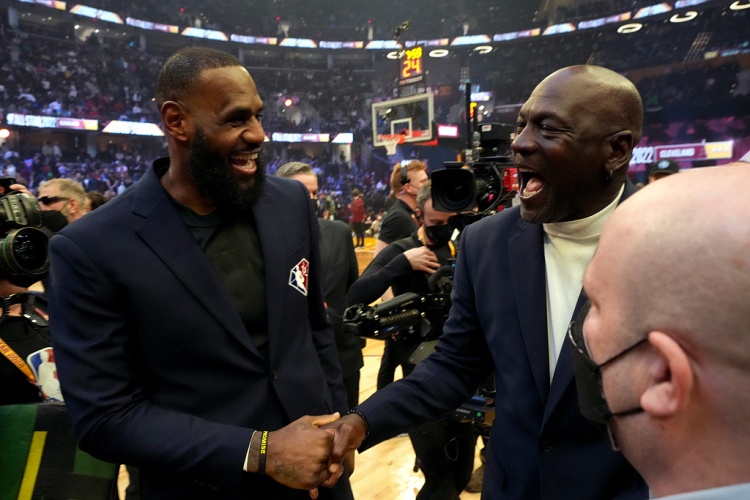
(The original article was published on July 14, the author is Greg Swartz in the open-air stands. The content of the article does not represent the translator's views)
Related news>>BR Top 100 Rankings: Jordan 1 James 2 Duncan 7 Curry 10 Kobe 11 Durant 13
The battle between the best players in religion, politics and NBA history. It is very likely that when you discuss the first two topics with your relatives and friends, you will be more mature and rational than discussing the third topic. The GOAT battle between Michael Jordan and LeBron James is not a new topic, but the "Top 100 Players in History" list released yesterday rekindled the war, and the jury in the open-air stands ranked Jordan ahead of James by 1 vote.
This protracted debate continues to ferment because as James continues to break the NBA career record, the legendary story continues to write a new chapter every year. Your perception of this matter may have been consistent over the past decade. Jordan's supporters always believe: Look at the NBA Finals record! James's fake falls too much! If you are from James's camp, you will always support James: Jordan retired three times! James is the more versatile player!
Obviously, both sides have very convincing arguments. With James being selected for the All-Star and All-Squad again this year, the length of his career and continuous output ability have further widened the gap with Jordan.
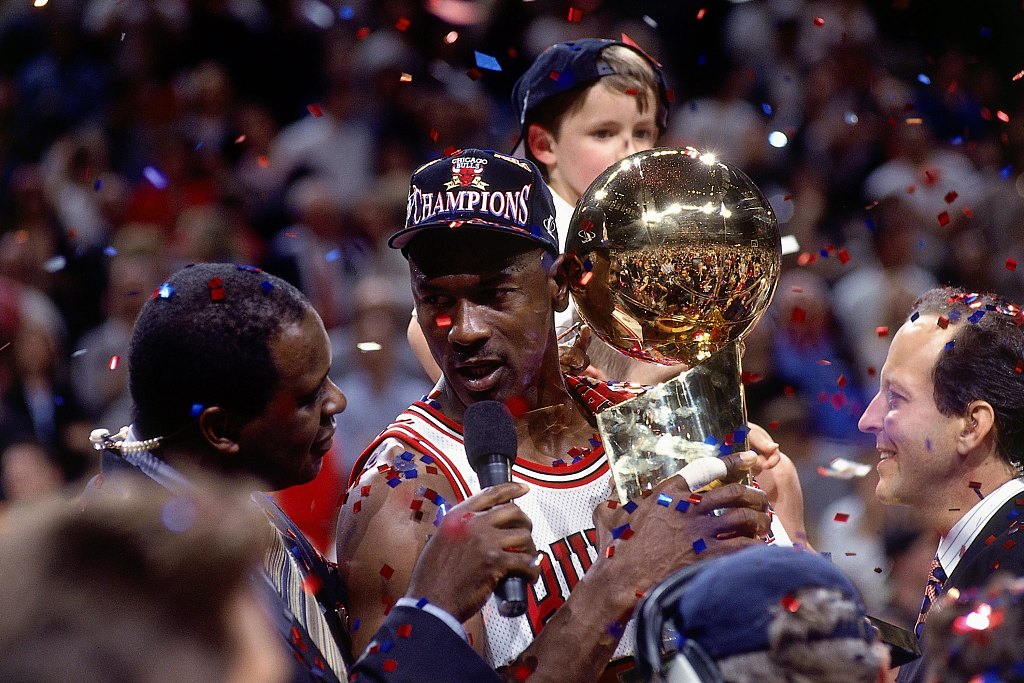
Jordan's field of superiority over James
It is ignorant to assert that James and Jordan's historical status are far from each other, and we should first recognize Jordan's outstanding achievements. No one in NBA history can replicate the legendary journey created by Jordan from the late 1980s to the 1990s, or rather, it was many legendary journeys. Regardless of personal performance or team honors, Jordan's peak height exceeds any stage of James' career.
From the 1986-87 season to the 1992-93 season, Jordan was crowned the scoring champion for seven consecutive years (ten career times), with the highest average of 37.1 points per game in a single season. The reason why David Robinson was able to become the scoring champion in the 1993-94 season was simply because Jordan announced his retirement for the first time that year.
In terms of pure scoring ability, Jordan beat James completely, and his defensive advantage is also at Jordan. Although James was able to truly compete with his explosive body size of 2.06 meters and 113 kilograms at his peak, Jordan has been the top defensive gate in the league for nearly ten years. Jordan not only won the Best Defensive Player Award in the 1987-88 season, but also was selected for the Best Defensive Team nine times in his career and won the Stealing King three times. Although James was selected for the Best Defensive Team six times in his career, he never scored DPOY. Jordan's five-seater regular season MVP trophy (versus four James) has a weak advantage, and the six championship rings (versus four James) have a greater lead. We will explain this in detail later.
If Jordan had not retired when he was at his peak in 1993, this debate might not have existed at all. If he did not retire for the second time after winning the MVP in 1998, winning the sixth championship and winning the finals MVP, and not returning to play for the Wizards in 2001, James might even miss the discussion area of GOAT. But history cannot be rewritten, and Jordan did retire three times. The first two retirements directly deprived him of his nearly five-year golden career, and ultimately weakened the persuasiveness of his first-person competitive history.
Next, it's time to provide evidence for James.
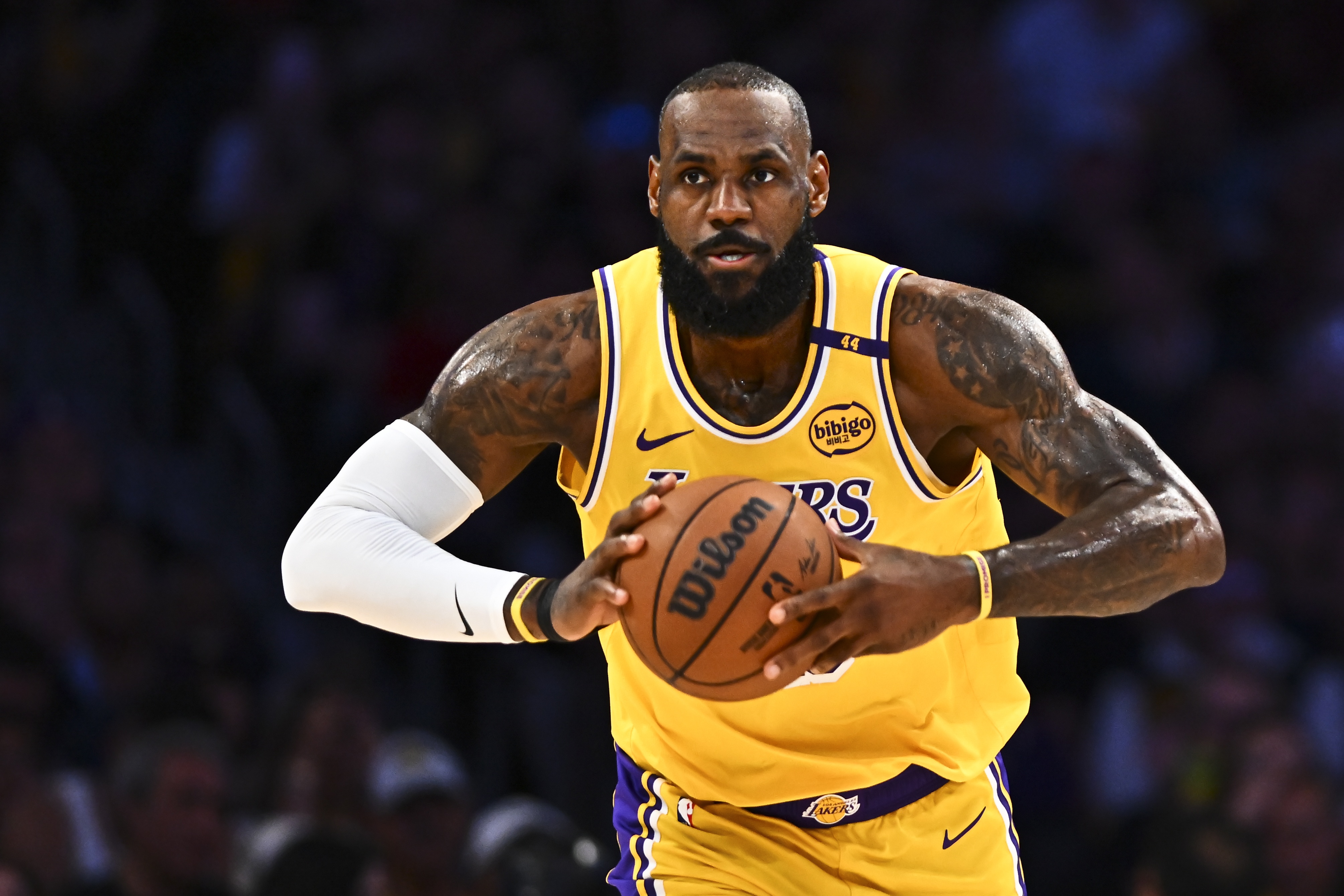
Basic data and all-round influence
We have confirmed that Jordan is the purer scorer among the two, and even James' supporters have to admit that this is something, but the score itself is not the decisive factor in the GOAT battle. Otherwise, Chamberlain, who averaged 50.4 points per game in a single season (1961-62 season) and ranked the top four in the NBA history single-season scoring list, should be firmly on the throne.
The core argument for James' best in competitive history lies in his ability to influence the game in all aspects, mainly reflected in the three major areas of scoring, rebounding and assists. Even Jordan fans must admit that James has a clear advantage in the latter two events. James' career rebounds per game (7.5) and assists (7.4) data completely suppressed Jordan (6.2 rebounds and 5.3 assists). Even if the average score is counted, James's three basic data (41.9) still leads Jordan (41.6) with a slight advantage.
Usually the player's late-career decline will lower the average game, and Carter, Garnett and Nowitzki are all examples. But James, 39, broke this rule: Jordan's three average data per game in the same season was only 29.9, while James can still contribute 40.4 average data output at the age of 40. Jordan is indeed a sharper scorer, but James is the more comprehensive basketball player.
Career data and rankings
Jordan maintains the highest record in his career average score with averaging 30.1 points per game, which is often cited by his fans as an argument. But in terms of historical status, the total career score may be a more objective measure.
Embide ranked fourth in history with 27.7 points per game, but is far from the top in the ranking of the best center in history. Trae Young ranked 13th in history per game with 25.3 points, higher than Kobe (25 points) and Jabbar (24.6 points). Booker averaged 24.4 points per game even surpassed Larry Bird (24.3 points), Julius Irving (22 points) and O'Neal (23.7 points). The top ten in the historical total score list can better reflect their legendary status, including James, Jordan, Jabbar, Kobe, O'Neal, Chamberlain and other temple-level superstars.
Of course, James' career total score is the highest in NBA history, and he is the only player to break through the 40,000-point mark (currently 40,284 points and still growing). James is currently leading Jordan by nearly 10,000 points, which is equivalent to the difference between Jordan and active player Lillard, ranked 37th..
The following is a comparison of James and Jordan's rankings in other career data lists:
Rebound: James No. 25 vs Jordan No. 141
Assist: James No. 4 vs Jordan No. 52
Steals: James No. 6 vs Jordan No. 4
Blocks: James No. 70 vs Jordan No. 126
Triple-double: James No. 5 vs Jordan No. 20
If James can surpass Jordan in the steal list (currently 169 differences), he will achieve a comprehensive suppression of the six major data lists. Objective discussion of finals record
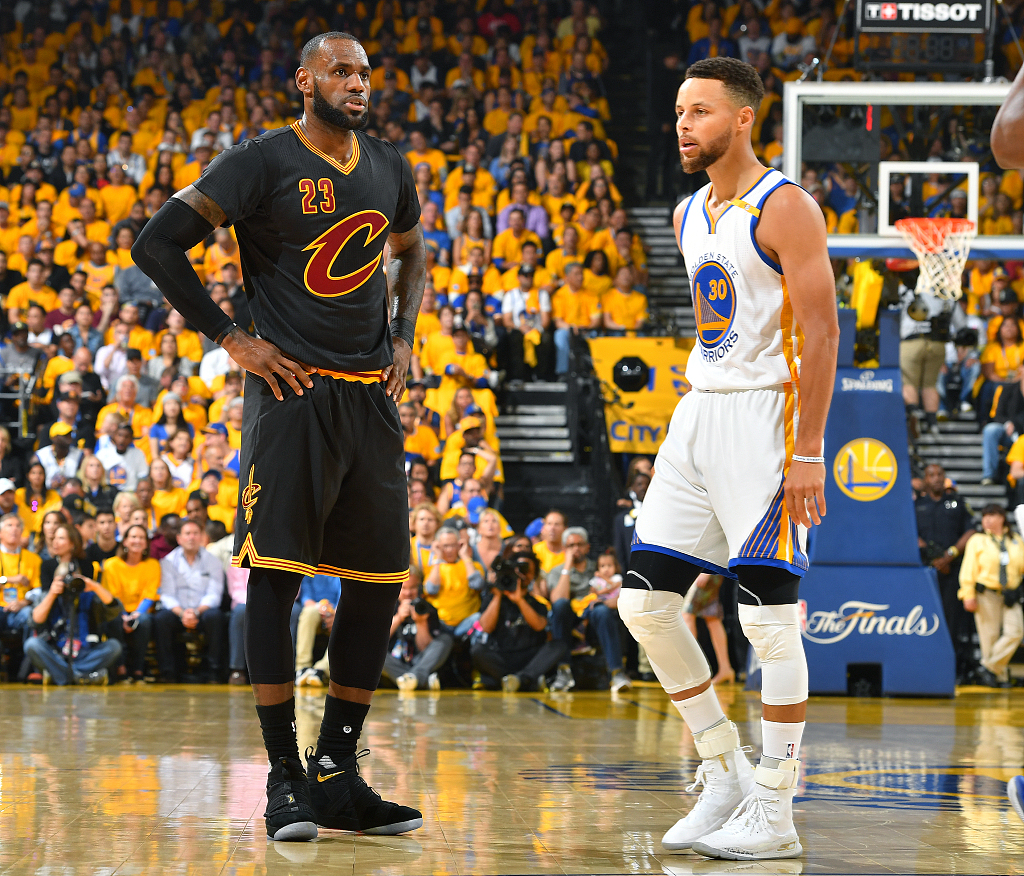
Jordan's finals record of 6 wins and 0 losses may be the strongest argument for his supporters. This is undoubtedly an achievement that shocks the past and is likely to never be copied in the future, but James' finals resume is also of unique value.
The feat of winning four championships + winning ten division championships (including eight consecutive years of advance to the Finals), has never been seen in the NBA since the Celtic dynasty in the 1960s. There is no intention to belittle Bill Russell and the Celtics, but it should be noted that before 1967, only six teams in the NBA were able to enter the playoffs. This means that the Celtics only had to win one round of series (four games) to advance to the finals and win the championship in two rounds (eight games), which was only half of the journey James needed. Even though Jordan led the Bulls to win six championships, he only needed to play a five-inning three-win series in the first round.
James is the only player in NBA history to lead three different teams to win the championship and win the Finals MVP for three teams. He has experienced five different coaches in his ten finals experiences, while Jordan has always fought under Hall of Fame coach Phil Jackson.
Although Jordan also encountered strong opponents in the finals, he had never experienced adversity like James. No matter how bad the lineup around Jordan is, he has never fallen into the situation where James led the team against Duncan, Parker and GinoBelgium in 2007. The Cavaliers' No. 2 scorer Larry Hughes scored only 2 points in the first two games in 44 minutes, and was later reimbursed for injury. It is a miracle that James can enter the finals, and a loss should not be a reason to blame.
With G1 Irving's injury and Love's first round reimbursement in the 2015 Finals, James still led the Cavaliers to a 2-1 lead against MVP Curry's Warriors. As for the Warriors who had 73 wins and 9 losses in the 2015-16 season (the best record in NBA history), and the Warriors who had Durant in the 2016-17 and 2017-18 seasons, their overall strength is far better than any opponent Jordan encountered in the playoffs. Despite this, James still won the next championship from the Warriors Dynasty, and Jordan's teammates never made such a low-level mistake in the finals (referring to JR Smith's decision-making mistake in the final moments of G1 in the 2018 Finals).
Admittedly, Jordan had more championship rings, but James played four more Finals. During this period, he had to endure the injuries and misfortunes of his teammates (such as the reimbursement of Irving Love in 2015), and he also had to fight against the Warriors dynasty, which had four future Hall of Famers (two of whom were the top ten levels in history).
Background factors are crucial, which makes the simple comparison between James and Jordan's "six-champ vs. four-champ" far from reflecting the real competitive environment.
Career Honors
James and Jordan's Honor Showroom are both brilliant. The two won 9 MVP trophys in total, 32 selected as the Best Team, 35 selected as the All-Star, and both were selected as the Best Rookie of the Year.
But the specific distribution of honor may subvert your perception. Jordan's 5-seater regular season MVP led James' 4 by a slight advantage (in fact both of them deserve more), and the following is a comparison of important honors:
All-Stars: James 21 times (historical record) vs Jordan 14 times
Best Team: James 21 times (historical record) vs Jordan 11 times
Best Team: James 13 times (historical record) vs Jordan 10 times
MVP Trophy: James 4 times vs Jordan 5 times
MVP Trophy: James 14 times vs Jordan 10 times
MVP Trophy: James 18 times vs Jordan Jordan 11 times
James not only maintained the lead in all categories except the number of MVPs, but also maintained a historical record of All-Stars and Best Team selections. Since his rookie season in 2003-04, James has won both honors every year.
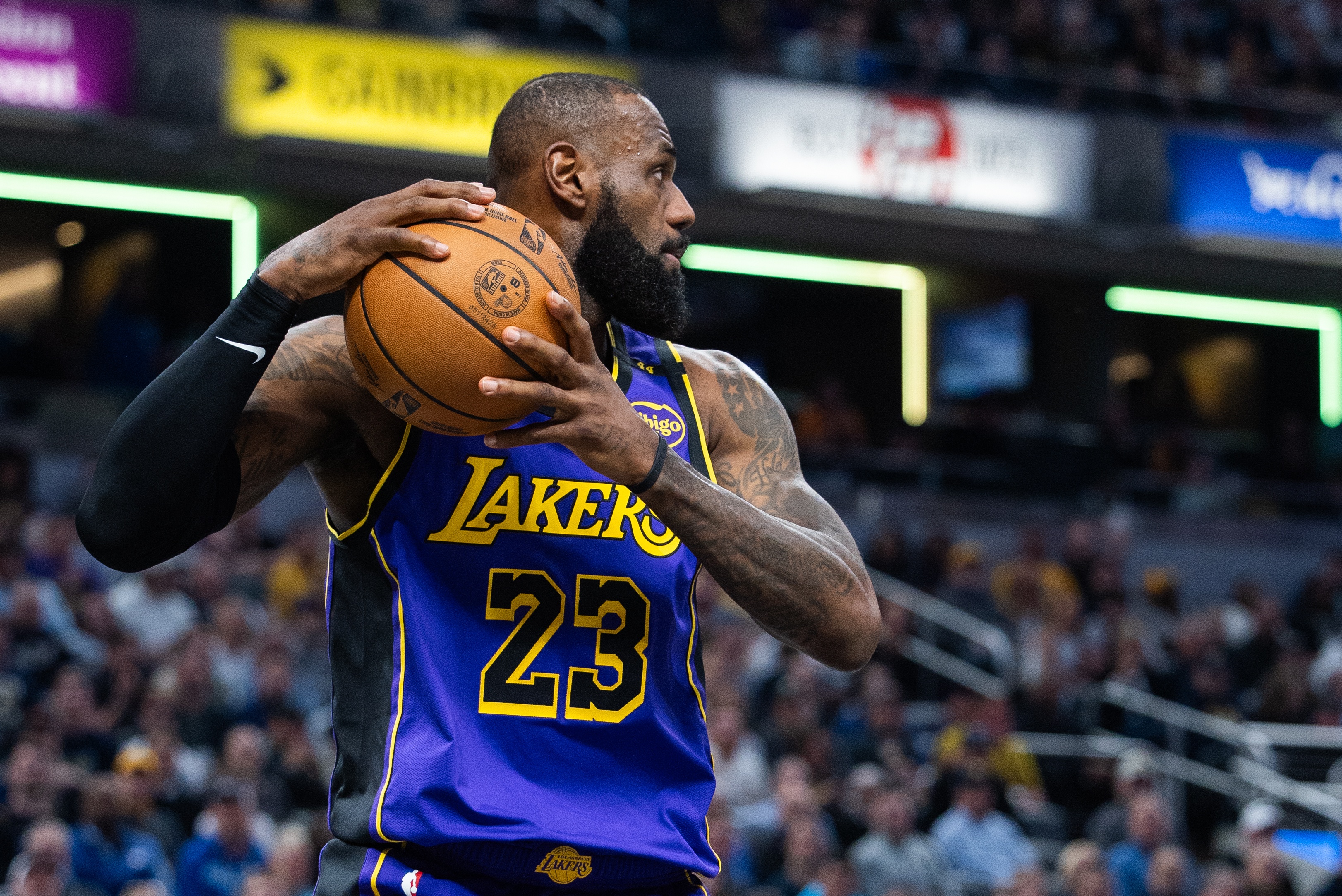
Durability and Final Conclusion
In the history of professional sports, no player has ever been under pressure from James before becoming a professional player. High school games before the streaming era can be broadcast nationwide, high school events are forced to move to college stadiums, and the famous cover of Sports Illustrated.
Jordan had just finished his last dance just a few months ago when James stepped into the NBA. The league is eager for a new appearance, and this is an unfair expectation for the 18-year-old who has just graduated from high school. Jordan still has a three-year buffer period for the University of North Carolina, and James was directly thrown into the fire after graduating from high school just a few months ago.
Nevertheless, he surpassed all expectations. James has maintained his peak for a long time, changing from setting the "youngest" record to setting the "oldest" record. James maintains his position as the youngest achiever by choosing any scoring milestone. Now, James is about to usher in his record-breaking 23rd NBA season, surpassing Carter's 22-season record. In his 22nd season of his career, Carter averaged only 14.6 minutes on the bench, scoring 5 points, 2.1 rebounds and 0.8 assists; while James still averaged 34.9 minutes per game and contributed 24.4 points, 7.8 rebounds and 8.2 assists per game, eventually ranking sixth in the MVP vote.
This is simply unreasonable.
James maintains an NBA record of 18 consecutive regular season scores of no less than 10 points. His peak period lasted until he competed with 10 father-son players in the same field, and became the first active father player in history to compete with his son.
When James first entered the league in 2003, Clinton stepped down as president for only a few years, Friends is still airing new episodes, and Twitter and iPhone are not yet available. At that time, celebrities such as Pippen, Carl Malone, Reggie Miller and Charles Oakley had not yet retired, and now some of them are over 60 years old. Throughout the history of human sports, no athlete in any event has maintained such a lasting peak output..
We have no way to predict how many more seasons James will compete. The 2025-26 season may be the last dance, but that will only come from his pursuit of career map in other fields, and is definitely not caused by the decline in competitive state.
20-year-old James averaged 27.2 points, 7.4 rebounds and 7.2 assists per game and was selected as the All-Star.
30-year-old James averaged 25.3 points, 6.0 rebounds and 7.4 assists per game and was selected as the All-Star.
40-year-old James averaged 24.4 points, 7.8 rebounds and 8.2 assists per game and was selected as the All-Star.
This is simply unreasonable.
Before James appeared, Jordan was undoubtedly the greatest player in NBA history. But now James has achieved his best overcoming Jordan with his all-round technology, data accumulation, career honors and unparalleled endurance.
The most terrifying thing? James, who may be years away from retirement, will only push his all-time total score record, All-Star and All-Squad to a truly unattainable height.
With the greatest respect for Jordan, James can only rank second in the GOAT discussion, but in fact James has won this title.
Original text: Greg Swartz
Compiled by: Li Taibai
source:vn 7m cn live scores